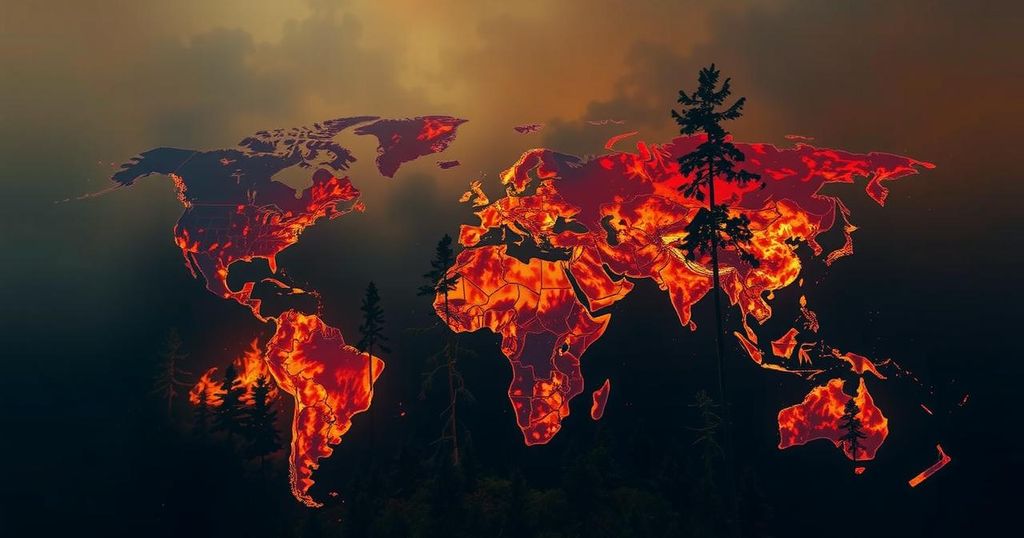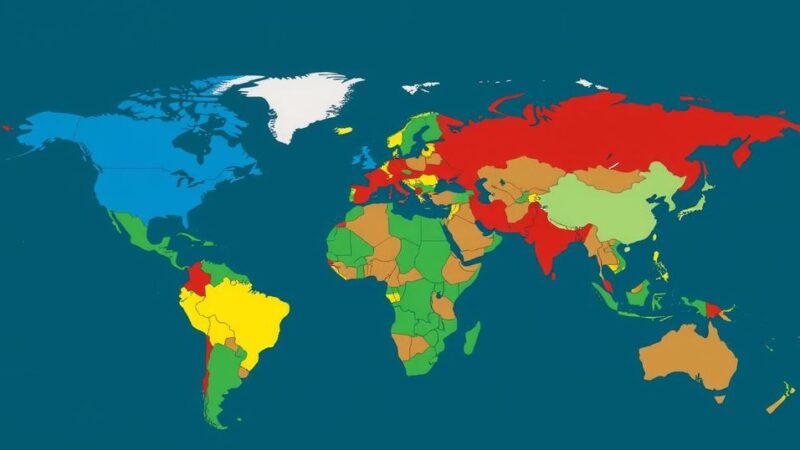Recent studies reveal a direct correlation between climate change and the increasing frequency and intensity of wildfires globally. An analysis from various research teams indicates that the number of smoke-related deaths has escalated dramatically since the 1960s, exceeding 12,000 annually in the 2010s. While human activities have mitigated some wildfires, the pervasive influence of climate change remains a dominant factor, necessitating urgent reforms in greenhouse gas emissions and fire management practices.
Recent research has established a significant connection between climate change and the growing frequency and intensity of wildfires on a global scale. This increase has corresponded with a rise in smoke-related fatalities, with estimates showing the death toll from wildfire smoke rising from fewer than 669 annually in the 1960s to over 12,000 in the 2010s. Two comprehensive studies, conducted by research teams from Dalhousie University, Belgium, the United Kingdom, and Japan, have investigated the impacts of wildfires on human health and the environment. One study, published in Nature Climate Change, compared wildfire models accounting for climate change against those that do not, revealing profound variations in wildfire occurrences and intensities particularly in vulnerable ecosystems such as the African savannas, Australia, and Siberia. Interestingly, while Africa accounts for approximately 70 percent of the global burnt area, it has seen a decline in wildfire incidents primarily due to increased human activities and land fragmentation, which inhibit fire spread. Conversely, regions like California and Siberia, characterized by extensive forests, have witnessed a marked rise in wildfire occurrences attributed to escalating drought conditions and elevated temperatures driven by climate change. Dr. Sian Kou-Giesbrecht, an associate professor at Dalhousie University, emphasized the significance of these findings, stating, “The study is important because it shows and quantifies the influence of climate change on increasing wildfires worldwide, especially given the impacts of wildfire on society and its feedback to climate change.” Utilizing models that integrate climate, vegetation, and population density, the researchers acknowledged that although human interventions, such as fire suppression and landscape management, can mitigate some of the impacts of wildfires, these efforts often prove insufficient during extreme weather events. According to Seppe Lampe, a climate scientist at Vrije Universiteit Brussel, severe fire seasons reaffirm the dominance of climate change effects over human control. “Although human activities such as landscape changes and population growth generally reduce the area burned, the effect of climate change continues to grow.” The simulations conducted demonstrated a near 16 percent increase in the global burned area from 2003 to 2019, with a correlating 22 percent increase in the likelihood of experiencing months of above-average burned area. Moreover, a separate study published concurrently delved into the human mortality associated with wildfire smoke, estimating that climate change may have escalated mortality rates from wildfire smoke tenfold over the last fifty years. Researchers associated up to 28 percent of wildfire-related deaths in the 2010s directly to climate change, a significant rise from one to three percent in the 1960s. Regions such as South America, Australia, Europe, and the boreal forests of Asia have reported the highest mortality rates from wildfire smoke. Dr. Kou-Giesbrecht highlighted the challenges in attributing wildfire frequency and intensity directly to climate change due to numerous interacting factors, yet emphasized the robustness of their findings across various models. The implications of continued climate change threaten to exacerbate the area of burnt land and the associated health repercussions dramatically in the coming decades. In conclusion, these studies elucidate the critical role of climate change in amplifying wildfire risks and their corresponding health impacts, accentuating the urgent need for significant and sustained greenhouse gas emission reductions along with effective landscape and fire management strategies to mitigate these dangers.
The increase in wildfires globally is becoming an alarming concern, closely intertwined with climate change. Researchers are noting an alarming rise in not only the frequency of these wildfires but also their intensity, which has significant implications for public health and the environment. Understanding the relationship between climate dynamics, human intervention, and wildfire occurrences is crucial for developing effective strategies to combat this growing threat.
The research underscores the undeniable link between climate change and the rising threat of wildfires worldwide, leading to increasing smoke-related health issues. Despite human efforts to manage landscapes and suppress fires, the overwhelming influence of climate change necessitates immediate action in reducing greenhouse gas emissions and adopting effective fire management strategies. A coordinated response is essential to protect lives, ecosystems, and livelihoods from the escalating impacts of wildfires.
Original Source: www.dal.ca






